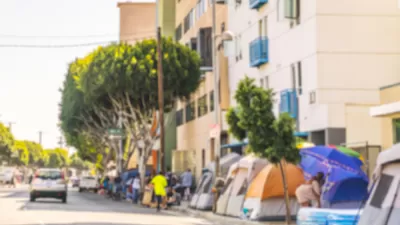Researchers at the Pew Charitable Trust have found that the neighborhood in which a child is raised is a powerful indicator of adult economic success.
There have been many ideas about how to predict success from childhood environment. The Freakonomics crowd found that the number of books in a child's home was an accurate indication of success in elementary school. The number of words spoken to a child early in life has also been found to predict literacy rates and test scores. But recent research suggests that, over the course of a lifetime, the neighborhood in which a child is raised is the best way to determine their likelihood to remain at or achieve middle-class economic status. "Researchers have found that being raised in poor neighborhoods plays a major role in explaining why African American children from middle-income families are far more likely than white children to slip down the income ladder as adults.
"The Pew Charitable Trusts Economic Mobility Project caused a stir two years ago by reporting that nearly half of African American children born to middle-class parents in the 1950s and '60s had fallen to a lower economic status as adults, a rate of downward mobility far higher than that for whites."
"Black children in neighborhoods in which poverty fell by 10 percent had higher incomes as adults than those who grew up in areas where the poverty rate stayed the same. This is a sign, they said, that simply improving the overall economy and quality of a given neighborhood can have beneficial effects on those growing up in it.
"The report does not address whether middle-income blacks should move to low-poverty areas for the sake of their children's future prospects. It is a thorny question -- many middle-income blacks have remained in high-poverty areas partly because of segregated housing patterns. And if they were to move elsewhere, the poverty rates in the areas left behind would rise."
Thanks to Franny Ritchie
FULL STORY: Neighborhoods Key to Future Income, Study Finds

Alabama: Trump Terminates Settlements for Black Communities Harmed By Raw Sewage
Trump deemed the landmark civil rights agreement “illegal DEI and environmental justice policy.”

Planetizen Federal Action Tracker
A weekly monitor of how Trump’s orders and actions are impacting planners and planning in America.

The 120 Year Old Tiny Home Villages That Sheltered San Francisco’s Earthquake Refugees
More than a century ago, San Francisco mobilized to house thousands of residents displaced by the 1906 earthquake. Could their strategy offer a model for the present?

In Both Crashes and Crime, Public Transportation is Far Safer than Driving
Contrary to popular assumptions, public transportation has far lower crash and crime rates than automobile travel. For safer communities, improve and encourage transit travel.

Report: Zoning Reforms Should Complement Nashville’s Ambitious Transit Plan
Without reform, restrictive zoning codes will limit the impact of the city’s planned transit expansion and could exclude some of the residents who depend on transit the most.

Judge Orders Release of Frozen IRA, IIJA Funding
The decision is a victory for environmental groups who charged that freezing funds for critical infrastructure and disaster response programs caused “real and irreparable harm” to communities.
Urban Design for Planners 1: Software Tools
This six-course series explores essential urban design concepts using open source software and equips planners with the tools they need to participate fully in the urban design process.
Planning for Universal Design
Learn the tools for implementing Universal Design in planning regulations.
Clanton & Associates, Inc.
Jessamine County Fiscal Court
Institute for Housing and Urban Development Studies (IHS)
City of Grandview
Harvard GSD Executive Education
Toledo-Lucas County Plan Commissions
Salt Lake City
NYU Wagner Graduate School of Public Service



























